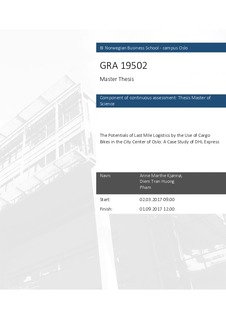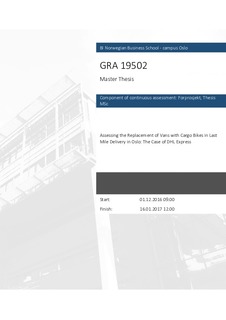| dc.description.abstract | For logistics companies, the last mile is considered the most expensive yet least
efficient and most polluting part of the entire supply chain, accounting for 13 to
75 percent of the total costs. The last mile often hinders city logistics due to
regulated traffic speed, narrow streets, and limited parking and unloading space.
Distribution of goods is an essential part in the development of sustainable
transport networks. Cities need to explore new ways of organizing goods transport
in addition to new transport modes to meet the negative externalities created by
transport companies. A mode that has gained widespread interest for urban
deliveries is the use of electric cargo bikes in last mile logistics. An estimation of
51 percent of all goods distribution using motorized transport modes in European
countries could be replaced with cargo bikes.
Oslo Municipality and the City Council are establishing new regulations to
increase urban life. With this in mind, a joint collaboration between the state, Oslo
Municipality and DHL Express was initiated, and led to the cargo bike project.
During Summer 2017, DHL Express implemented cargo bikes to their vehicle
fleet in order to meet the increasing demand for sustainable solutions in Oslo.
The thesis is a case study in Operations Research that investigates the
potentials of last mile freight transport by implementing cargo bikes to DHL
Express’ vehicle fleet in the city center of Oslo. It evaluates the performance of
cargo bikes as supplement for vans within a limited area, and its influence on
productivity, environmental impact, and service level. It assesses the existing gap
in research regarding the implementation of cargo bikes in Norway from a
business perspective.
Two models were developed for the delivery and pickup process, in terms
of the current system and pilot project. Simulations were performed to determine
the effect of changing the system. In addition, a qualitative analysis was included
to strengthen the validity of the study. Based on the analyses, the main findings
suggest a potential of implementing cargo bikes to the vehicle fleet. The results of
the study prove that by replacing vans with cargo bikes in a limited area in Oslo,
DHL Express is able to increase the productivity and service level, while reducing
CO2 emission. Evidently, cargo bikes have the potential of reducing traffic
congestions, and handle goods more efficiently in terms of better accessibility to
customers. | nb_NO |

